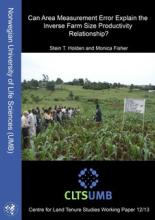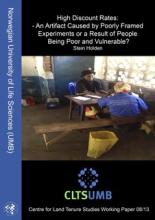Land Library
Welcome to the Land Portal Library. Explore our vast collection of open-access resources (over 74,000) including reports, journal articles, research papers, peer-reviewed publications, legal documents, videos and much more.
/ library resources
Showing items 1 through 9 of 47.Examines the role of development cooperation in land reforms and the extent to which donor organisations have addressed concerns related to gender equality. Reviews the reforms in 15 countries in Africa, Latin America and Asia, with a focus on Ghana, Tanzania, Uganda, Zambia and Nicaragua.
Tanzania’s land reform from 1999 has been evaluated as among the most gender-sensitive of its kind in sub-Saharan Africa. However there is a gap between the legal framework and what is happening on the ground.
The existence of an inverse relationship (IR) between farm size and productivity in tropical agriculture remains a debated issue with policy relevance.
Ethiopia. Access to agricultural land is a constitutional right for rural residents of Ethiopia. We used survey data from the relatively land abundant districts of Oromia Region and from the land scarce districts of Southern Nations, Nationalities and Peoples’ (SNNP) Region.
Paper presented at the 14th global conference of the International Association for the Study of Commons, Mt Fuji, June 3- June 7, 2013
The paper uses three years of household farm plot panel data (2006-2009), covering six districts in central and southern Malawi to assess factor productivity and farming system development under the input subsidy program. All farm plots of the households were measured with GPS.
This study revisits the issue whether poverty and shocks are associated with high discount rates by using an incentive compatible Multiple Price List approach in a poor rural population in Africa where a substantial share of the population had been affected by drought in the recent rainy season.
This study finds that female-headed households have 23% smaller owned landholdings and 54% smaller operational landholdings.
This paper is about land tenure relations among the matrilineal and patrilineal cultures in Malawi. Data from the National Agricultural and Livestock Census are used to characterize marriage systems and settlement and landholding patterns for local communities.








